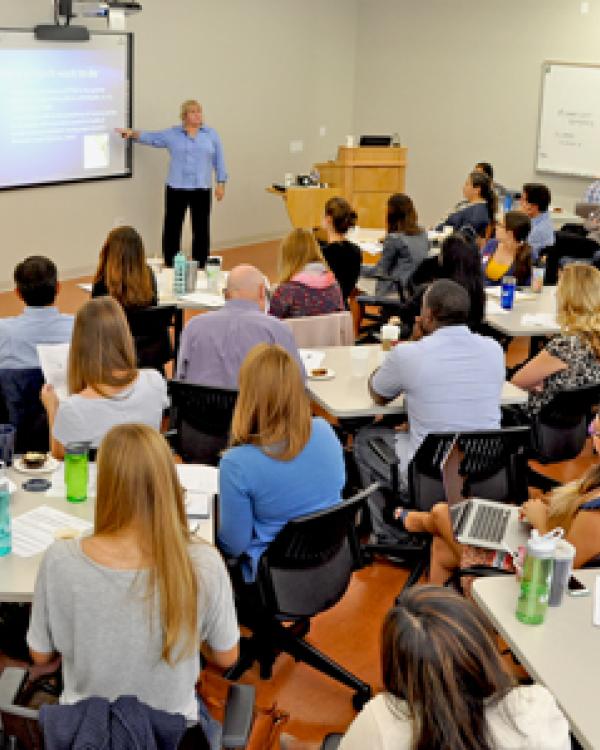
Dr. Robyn Walser leads the "Life After Trauma" training on October 24 in the Education Building
The Hosford Counseling and Psychological Services Clinic at UC Santa Barbara’s Gevirtz School – along with The Office of the Chancellor, UCSB’s Counseling & Psychological Services, and the Veterans Resource Team – sponsored a daylong training led by Dr. Robyn D. Walser entitled “Life After Trauma: Using Acceptance and Commitment Therapy to Revitalize Interrupted Lives” on Friday, October 24. Over 50 mental health professionals, including faculty and students from the Department of Counseling, Clinical, and School Psychology, attended the event that was held in response to the tragic events in Isla Vista this past May.
“The training was informative and inspiring,” says Dr. Heidi Zetzer, Director of the Hosford Clinic. “Our presenter did an amazing job creating a foundation for understanding the nature of the human experience, especially in relation to trauma and loss. This approach to counseling and psychotherapy starts with a recognition of the universality of human suffering and normalizes the experience of negative feelings in response to traumatic events. We learned that sometimes our best effort to cope with negative emotions actually compounds suffering and limits our choices. This approach helps people take steps in directions that are meaningful to them. It was a great experience and I hope that we can have more training like this one.”
Acceptance and Commitment Therapy (ACT) is an evidence-based intervention that is designed to address human suffering in a mindful and compassionate way. While ACT has been applied to a wide variety of problems, it is well suited to the treatment of trauma and trauma related problems. The aftermath of war and certain military experiences, assaults (including use of weapons and interpersonal violence), manmade and natural disaster as well as childhood and other traumas can have long-term effects. The painful emotional experiences found in the aftermath of trauma often leads to symptoms of PTSD, depression and anxiety, and other issues related to life functioning, including a variety of behavioral problems ranging from substance abuse to relationship problems. Many of the post-trauma attempts to recover involve regaining control over distressing responses to trauma such as intrusive thoughts, and on-going feelings of sadness and fear. While some attempt to control these experiences can be expected and useful, many attempts to control emotions and thoughts result in a furthering of the suffering experienced post trauma. ACT seeks to reduce rigid and inflexible attempts to control negative emotions by fostering acceptance through mindfulness and defusion techniques, as well as revitalizing lives by defining personal values and committing to taking actions related to those values. The ultimate goal in acceptance and commitment therapy is psychological and behavioral flexibility in the service of a more workable life - a way of making order out of a disorderly world.
Robyn D. Walser, Ph.D. is Director of TL Consultation Services, Associate Director at the National Center for PTSD, and is Associate Clinical Professor at UC Berkeley. As a licensed psychologist, she maintains an international training, consulting, and therapy practice. Dr. Walser is an expert in Acceptance and Commitment Therapy (ACT) and has co-authored 3 books on ACT including Learning ACT, The Mindful Couple, and Acceptance and Commitment Therapy for the Treatment of Posttraumatic Stress Disorder. She also has expertise in traumatic stress and substance abuse and has authored a number of articles and chapters and books on these topics. She has been doing ACT workshops since 1998; training in multiple formats and for multiple client problems.